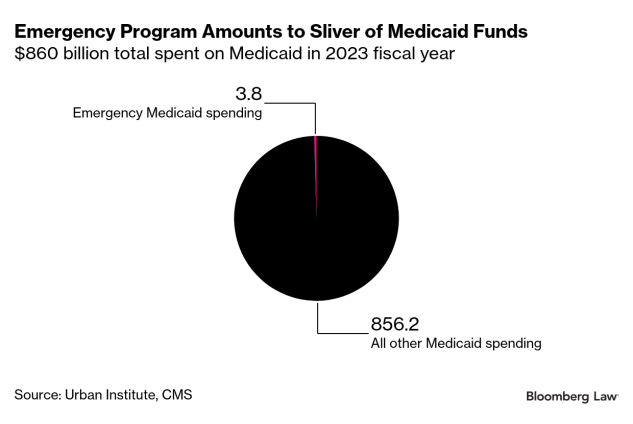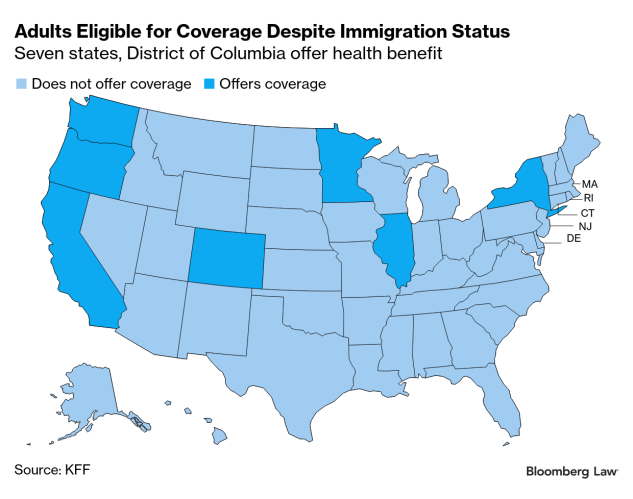- Program for immigrants in emergencies likely to see attention
- Some states have robust defenses to weather legal challenges
The Trump administration’s laser focus on curtailing illegal immigration could test Medicaid programs that offer various forms of the low-income insurance benefit to patients regardless of immigration status, lawyers say.
Among those programs is emergency Medicaid, which offers temporary coverage to patients at risk of fatal or disabling medical emergencies who wouldn’t traditionally be able to enroll in the program due to their immigration status.
The potential for added scrutiny comes amid a rash of executive orders by President
The program was launched shortly after passage of the Emergency Medical Treatment and Labor Act in 1986, which amended the Medicaid Act to allow the federal government to reimburse states for emergency care without taking a patient’s immigration status into account.
Medicaid programs across the nation now offer emergency Medicaid coverage to noncitizens, including those not considered lawfully present in the US. Federal and state governments spent a total of $3.8 billion on emergency Medicaid services in fiscal year 2023, according to the Congressional Budget Office.
Although emergency Medicaid is estimated to account for 0.4% of total Medicaid spending in 2023, policy watchers like Brett Friedman, former New York state Medicaid director and current partner at Ropes & Gray, say the program may face inquiry from the Trump administration that could lead to possible moves to rein in the program.
“There is a concern if the Trump administration wanted to do something involving current federally endorsed coverage of people who are undocumented, emergency Medicaid is No. 1.
“You can either completely do away with it—which would be hard to do under the Medicaid Act because it’s a federal requirement—or you could issue guidance that further constrains and curtails what is appropriate for emergency Medicaid coverage,” Friedman said.
Constitutional Question
The Centers for Medicare & Medicaid Services has generally given states the discretion to define which conditions qualify for emergency coverage. But Andrew Cohen, lead attorney at Health Law Advocates, a public interest law firm, said there historically has been ambiguity over when an emergency medical condition ends.
Emergency Medicaid coverage varies significantly across states, with each state determining which emergency conditions qualify for reimbursement.
For example, some states approve routine dialysis treatments for end-stage renal disease under emergency Medicaid, while other states consider the condition an emergency only when a patient becomes critically ill.
“I think that’s an area where there could be some momentum for a Trump administration looking to curtail health coverage for people who are undocumented,” Cohen said.
However, moves to retrench states’ ability to define the size and scope of this emergency coverage would likely see legal challenges, he said.
“The legal framework around a program like this is significant,” Cohen said.
“There is statutory authority for this program under the Social Security Act. Second, each state has a state plan for its Medicaid program. Those plans have been proposed, vetted, and approved by the federal government,” he added.
Maneuvers seeking to coerce states by withholding federal dollars could also raise a constitutional question over how much authority the executive has to pressure states into compliance with federal directives, said Cohen.
Several US Supreme Court decisions over the decades have congealed a legal principle known as the anti-commandeering doctrine, which prevents the federal government from requiring states to enforce federal law.
For example, in 2012’s National Federation of Independent Business v. Sebelius, the Supreme Court struck down a provision of the Affordable Care Act that would have financially punished states if they did not expand Medicaid eligibility.
Cohen said a similar move from the administration could reach the Supreme Court, although it’s unclear whether the court, which has a 6-3 conservative majority, would decide in congruence with previous decisions.
“The legal arguments are really complicated and usually really technical, and there’s usually a bunch of them. So, the question is, will that precedent be extended?”
Uncertain Future
Immigration advocates like Victoria Francis, deputy director of state and local initiatives at the American Immigration Council, also say aggressive moves to uphold the Trump administration’s immigration agenda could spill over to states that offer Medicaid-like coverage to undocumented immigrants.
Fourteen states and the District of Columbia provide comprehensive state-funded coverage for undocumented children. Seven states, including California, Illinois, and New York, go a step further, extending a state-funded health benefit to income-eligible adults regardless of immigration status, according to KFF.
Presidential adviser Elon Musk took to his X account Feb. 17 to suggest that the $9.5 billion California spent on health coverage for undocumented immigrants was a harbinger of rampant fraud.
Although federal law restricts traditional Medicaid coverage to immigrants who have been “lawfully present” in the US for at least five years, Michael Cannon, director of health policy studies at the Cato Institute, said states using their own money to expand comprehensive Medicaid-like services to immigrants would likely be insulated by the same constitutional principles that protect emergency Medicaid.
“The federal government has no authority to tell states how to spend their own money. It’s only if the states are using their money to draw down federal matching funds,” Cannon said.
Friedman said it’s possible states could see the administration exercise its audit rights to ensure the federal government is not devoting resources toward state-run benefits for undocumented people.
For example, a 2024 audit from the US Department of Health and Human Services Office of Inspector General found California improperly claimed more than $50 million in federal Medicaid funding for health services for people with unsatisfactory immigration statuses.
“I think it’s a good acknowledgment to states, in light of this federal environment, that if you are providing Medicaid-like coverage to people who are undocumented using state-only dollars, that you’re careful about how your time is allocated to make sure it’s not unnecessarily going to sources that are federally matched,” Friedman said.
To contact the reporter on this story:
To contact the editors responsible for this story:
Learn more about Bloomberg Law or Log In to keep reading:
See Breaking News in Context
Bloomberg Law provides trusted coverage of current events enhanced with legal analysis.
Already a subscriber?
Log in to keep reading or access research tools and resources.


